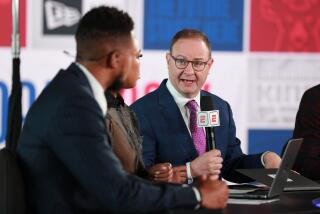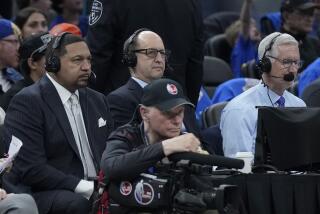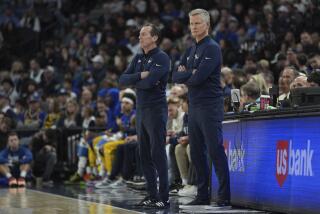Knicks Lose More Luster
Toll the bell slowly: Pat Riley ... Ernie Grunfeld ... John Starks
Who’s next, Spike Lee?
Everyone who made the Knicks the Knicks in the ‘90s, the hottest ticket in the biggest apple, is now gone with Saturday’s surprise-only-as-to-timing announcement by Van Gundy, their twerp who roared, that he was resigning as coach.
In doing so, he walked away from a team that had just won five of six games and left $6.5 million on the table and a contract that ran through next season.
Not that he was likely to have lasted through next season, of course.
His tenacious Knicks were still competitive, at least at the lower reaches of Eastern respectability, but title contention was out of the question. Their pursuit of it was little more than an illusion they kept alive to sell $1,500 courtside tickets.
As Van Gundy knew, the illusion required scapegoats. Having watched his departing mentor, Riley, vilified, then having survived an internal struggle with his general manager, Grunfeld, and having outlasted Checketts, the powerful Madison Square Garden president who had him marked for extinction, no one had to tell Jeff who would be next.
Besides, it was no longer the same.
The men who built this man-eating beast were slick showmen, but the men who now run the Knicks might as well have ridden into town on the same turnip truck.
Scott Layden, the third-year general manager, is a top personnel man but so shy, even Salt Lake City reporters complained about his reticence when he was running the Jazz.
In place of the suave Checketts is James Dolan, who, insiders say, owes his advancement to being the son of Charles Dolan, who runs the Garden’s corporate parent, Cablevision.
Checketts was a master of intrigue, courting influential newspapermen, paying them off with inside information, giving out sensational quotes and coming up with ways to keep the circus playing.
Dolan the younger is loath to talk to reporters and stiff when he does. He refused interviews for months and when he finally agreed to sit down with the New York Daily News’ Frank Isola, brought a public-relations aide along as if he was afraid Isola might try to torture the truth out of him.
Then James said stuff like: “Our intention is to field the best product that we can.”
You don’t say.
“Say what you want about Dave, but Checketts was a do-er,” an unnamed general manager told the Daily News’ Mitch Lawrence. “ ... He needlessly gave people more money than they were worth, but he was pro-active. You’d call him up and he’d say, ‘Except for Ewing, I’ll do anything for the right price.’
“Dave was always willing to pull the trigger.”
In the end, of course, Checketts wound up shooting himself in the career, but, as he noted late in his tenure, that’s how things went at the Garden.
We’re talking only about style, but style is very important in a media capital.
As far as actually doing the job, it didn’t matter who was there, it was more impossible each season as the Knicks deferred rebuilding in favor of a patch-and-go approach so they could keep milking their cash cow. With the Garden gross up to $1 million per game, everyone pretended this might actually lead somewhere.
In real life, the team, which had been tough and, when challenged, riot-prone, became puny, with a three-guard lineup and a fragile, 225-pound center.
The salary cap was hopeless. After years of desperately signing anyone, the Knicks have an $88 million payroll--$35 million over the luxury tax threshold, which means they’ll get socked that much next summer.
They can’t get under the cap until 2005, putting them on the outside for the big free agent class of ‘03, even if they could find a superstar who would jump into a black hole in an environment heavy on teeth.
Nevertheless, for five-plus seasons, Van Gundy made it work, even reaching the 1999 NBA finals after finishing No. 8 in the East, even as Checketts leaked word that he could be terminated the first time they faltered in that postseason.
Van Gundy was as improbable as they came. In a situation that demanded a star like Riley, he was a little nobody, a six-year Knick assistant.
In a job in which charisma counts, Riley looked like a leading man in the movies. Van Gundy looked like a clerk.
Not only was Van Gundy small, slight and balding, he was given to opera bouffe touches, like the 1999 playoff game when he tried to break up a fight and wound up on the floor, hugging Alonzo Mourning’s ankle, as Zo dragged him around like a terrier.
Then there was the time Van Gundy left his Honda Civic (Riley had been ferried around in limos paid for by the team) on the airport runway, and had it totally demolished by a jet blast from the Knick charter.
Or as the Associated Press put it: “Jeff Van Gundy’s Honda Civic got some serious hang time.”
Nevertheless, Van Gundy had a fine basketball mind and great poise. The players--especially Ewing--liked him, and together they fought to keep the tide from going out.
Last spring, however, a young Toronto team ousted them in the first round for the first time in Van Gundy’s six postseasons.
Last summer, Layden’s efforts to rebuild netted only players like Clarence Weatherspoon, Howard Eisley and Shandon Anderson, none of whom crashed the starting lineup.
Coincidentally or not, Van Gundy said Saturday, he found he didn’t feel like coaching.
Other coaches he consulted told him not to make any sudden moves so he hung on ... until Saturday.
The only surprise was that it came so soon, because Van Gundy had been dropping hints all over New York.
Two weeks ago, with beat reporters arching eyebrows, he gave what seemed like a farewell speech, saying the Knicks “got me into professional basketball. I got to work for three coaches who won over 700 games in the NBA. No one would have hired me as a head coach except Dave Checketts. It’s allowed my family to stay in one spot; it set me financially for life. I am eternally grateful and indebted to the New York Knicks.”
Then an unnamed associate told Ian O’Connor of the News-Journal in Westchester County: “Jeff knows this is his last season with the Knicks. He’s just going to work his butt off until they come to get him.”
A week later, with the team playing better but Van Gundy feeling no better, he says he knew it was time to go.
“I’m just going to take a step back and exhale for the first time in 13 years,” he said. “Coach Riley stole my line a long time ago. I said it’s like coaching in dog years. I’ve really been coaching here 42 years.”
Well regarded now, he’ll automatically be the front-runner if jobs come open in Portland, which was refused permission to interview him last summer, and Miami, where Riley has hinted he may move upstairs.
Van Gundy went out as he came in, like Everyman. Asked about his legacy, he joked: “Not good at breaking up big men’s altercations.”
His legacy is that he stayed on that bucking bronco for almost seven seasons, longer than any Knick coach except the hallowed Red Holzman and Joe Lapchick.
But nothing is forever, as the Knicks may soon learn, not even illusions.
More to Read
Go beyond the scoreboard
Get the latest on L.A.'s teams in the daily Sports Report newsletter.
You may occasionally receive promotional content from the Los Angeles Times.










